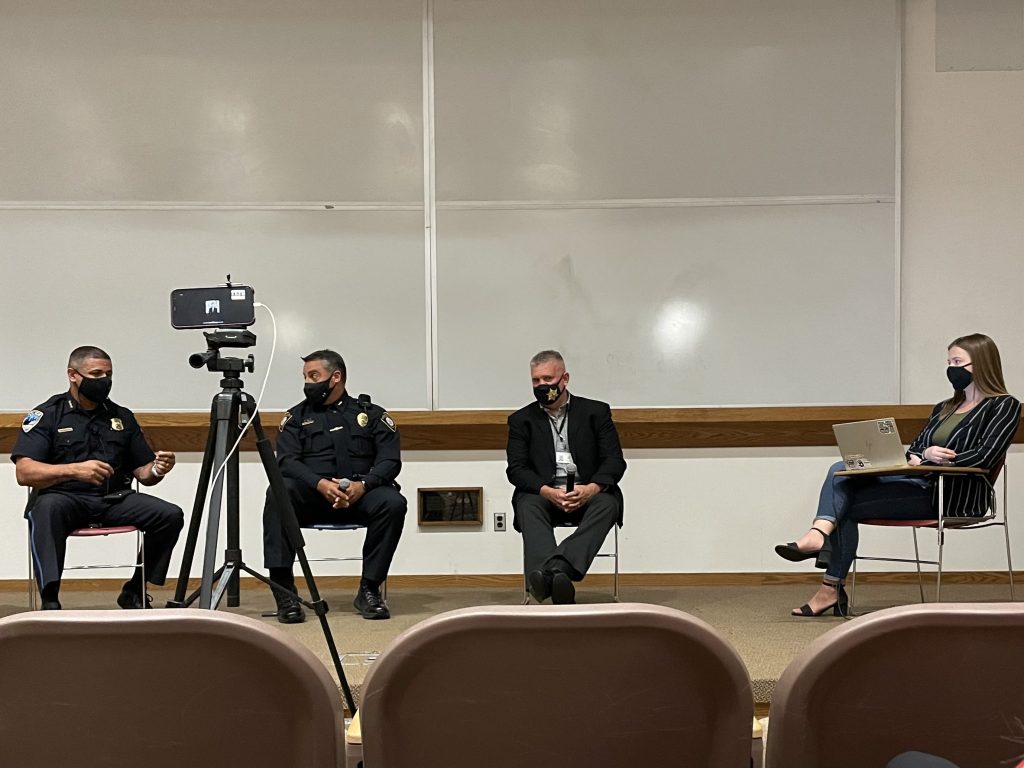
Three members of the Peoria police community discussed their lines of work in a Q&A event held by the Student Senate Wednesday evening in Neumiller Hall.
The event hosted Bradley Police Chief Brian Joschko, Peoria County Sheriff Brian Asbell and Peoria Police Chief Eric Echevarria as guest speakers.
Emma Hoyhtya, speaker of assembly, joined the guests on the hall stage and asked them questions, with the conversation additionally being recorded and shared through Zoom so people could tune in virtually and submit questions in the chat.
In the days leading up to the panel, Student Senate advertised the event as an opportunity for students to get insight into the safety efforts in place on campus.
The evening began with the guests shedding light on their departments’ responsibilities, which Hoyhtya proposed as it would give students good background knowledge.
Joschko gave a high-level overview of the university police department. He explained that their sworn staff, while below the usual authorized number of 21 officers, is supported by their non-sworn positions. These positions include a public safety officer, several support staff that handle the car access system and security cameras and an on-campus dispatch sender responsible for dispatching the department and its services unit.
He also stated that the department has community-wide jurisdiction reinforced by the city and county of Peoria, and that it spends half its time on campus and otherwise focuses on off-campus areas populated by juniors and seniors, where it shares space with other police departments.
“We have a great working relationship with our law enforcement partners,” Joschko said.
Asbell explained that his job as a sheriff differs from a chief’s job in that he serves a four-year term at the highest position of Peoria County’s law enforcement. He stated that he currently has 180 employees on top of contractual staff in fields including correctional healthcare, psychology, sanitation, engineering and maintenance.
Asbell mainly works under four areas: law enforcement, managing the county jail, managing the county courthouse and being the officer of the court. He stated that the jail is what creates the most work for him, as it’s where he has most employees.
“When I hire folks, I require them to start in the jail first,” Asbell said. “It’s all about building life skills — learning how to communicate, learning how to de-escalate. … My fear has always been that you cannot work inside the cell and learn how to communicate, because this job is 99% communication.”
Prompted by Hoyhtya, the talk grew more in-depth as Echevarria shared the story of how he got into his position, with him stating that he followed an unlikely path.
Born and raised in a distressed community area in Elgin, Illinois, Echevarria credited his parents with removing him from the environment. After going into the Marine Corps in 1993 and leaving in 1997, he applied for policing on a whim as some of his friends were in it, and ended up fourth on a list of 500-600 applicants. He eventually worked up the ranks and became the first Latino lieutenant and commander in Elgin.
“It was probably the best decision I ever made,” Echevarria said. “I absolutely love my job; I love what I do. I don’t love the situations that we’re in, but I love the job.”
When asked if he found any difference in patrolling Elgin as opposed to Peoria, he stated that while he mainly took to the new experiences, he found quirks in both cities, such as Elgin’s squad cars all using different keys and Peoria’s officers being “stuck in a time warp”.
“I have detectives still walking around with flip phones a week ago, two weeks ago,” Echevarria said.
Joschko then fleshed out his day-to-day workload, describing the Bradley department’s emphasis on engaging with the community by having officers present throughout to respond to crimes and interact with university members. He highlighted the most important objective for the department to ensure the safety of the students and staff.
Asbell echoed Joschko’s idea of community relationships through his experiences in the wake of both COVID-19 and the nationwide abuses of police power seen over the past few years, simultaneously speaking on his struggles shutting down the jail to only let select arrest cases in and his efforts to better the community by starting jail programs.
Hoyhtya bounced off of his point to ask the guests what changes they were interested in making.
Echevarria proposed funding to help issues, such as homelessness and mental health, and integrating mental health specialists and social workers with the process of officers being dispatched and helping crime victims.
Joschko noted changes that had been implemented over his 10 years of being in the department, including training officers in areas such as crisis intervention. Asbell touched on his emphasis on officers wearing body cams following the passing of House Bill 3653, set in place to make police misconduct more transparent.
The evening concluded with Hoyhtya asking guests how they saw the relationship between police and students. Joschko reiterated the department’s emphasis on students, further bringing up the creation of the BUPD’s Student Safety Advisory Committee, while Asbell stated how forums between police and students helped show both sides that the other is made up of normal people. Echevarria talked about his past interest in student internships for his police department, leading to productive collaborations with high school STEM students.
“I tell my kids …‘You guys are so much smarter than I was at that age,’” Echevarria said. “I think that there’s some things in creativity that you bring that sometimes … we’re so busy with other things that we don’t have time for that creativity.”




